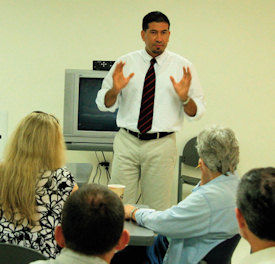 |
| Professor Jorge Cubillos leads a discussion on assessing second language listening comprehension |
Listening assessment focus of faculty workshop
How does a teacher know that students are making progress in developing their listening skills? In June 2008, this was the focus of a daylong professional development workshop for 25 faculty, staff and tutors.
Professor Jorge Cubillos of UD’s department of foreign languages and literatures and an authority in language testing, reminded the group of the two types of language processing–– top down, grasping the main ideas and then filling in the details, and bottom up, piecing together small elements of language, such as words or phrases, to form the big picture. Cubillos emphasized that both top-down and bottom-up skills need to be explicitly taught and tested.
Cubillos reviewed the characteristics of a good test, including practical considerations such as time and length, test reliability and validity, and then tackled the nitty-gritty of test development.
Before teachers write a test, he explained, they must define its goals and specifications, including context, tasks, vocabulary, grammar and format. The writing, too, is a demanding process. When complete, the first draft is piloted, the results are analyzed and revisions are made. While a quiz might be completed in a week, the development of a placement or exit test, Cubillos warned, is a long, complex process that can take a year or more.
Thanks to Professor Cubillos, participants left the workshop with the tools for creating more effective listening assessments and with a deeper appreciation for the art of test making––a process as complex as the listening process itself. • SP